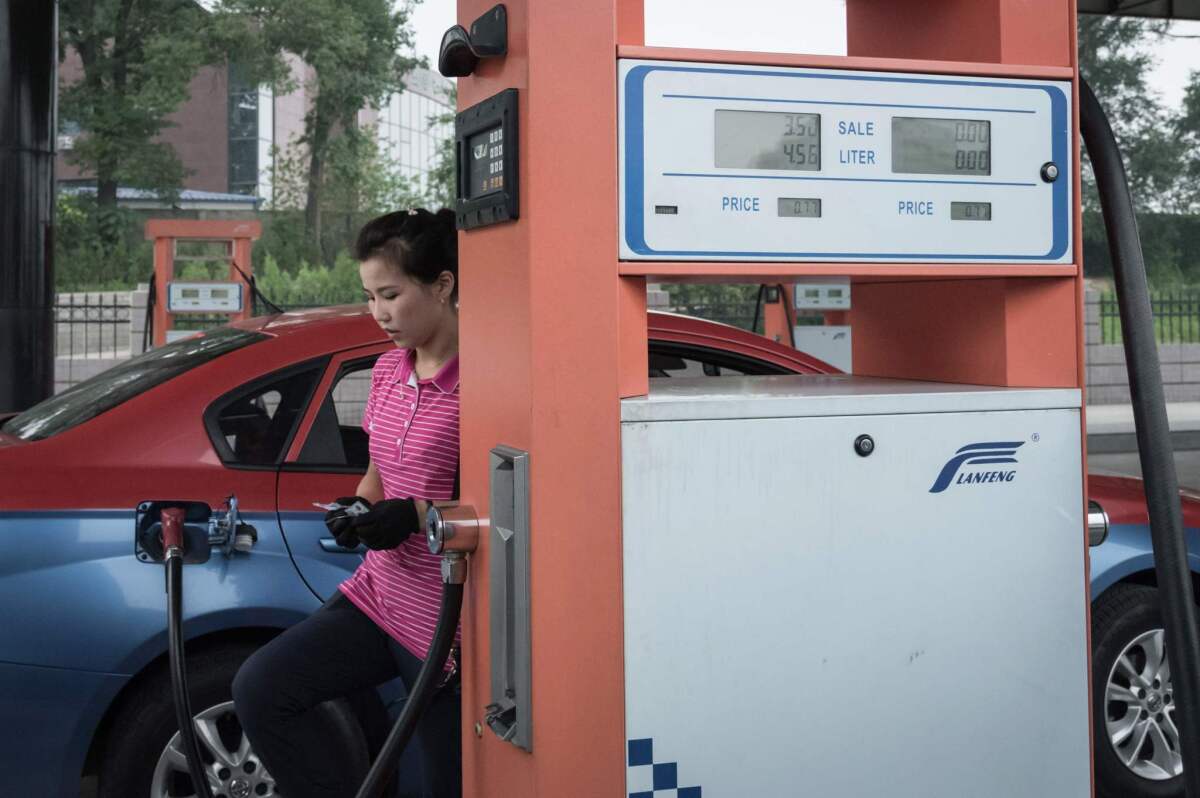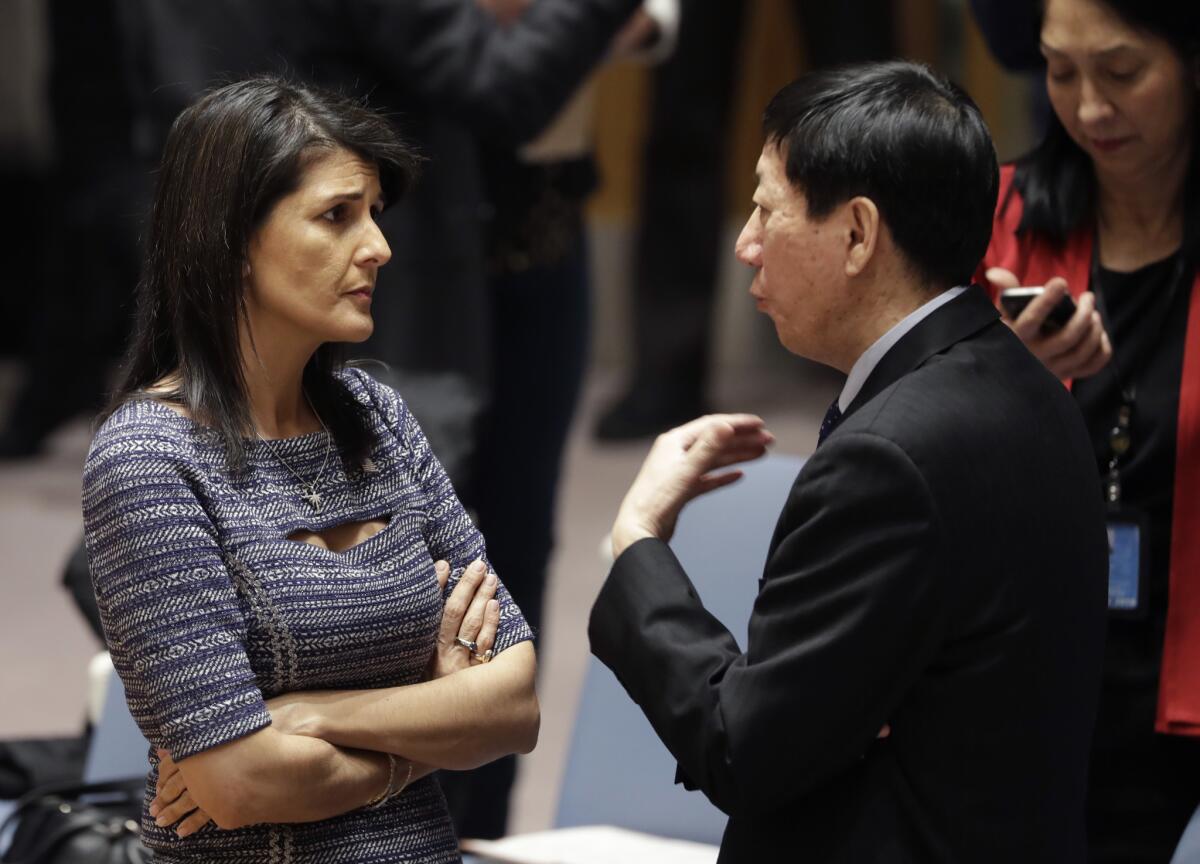Are sanctions against North Korea working? The Trump-Kim summit may depend on it
- Share via
Reporting from Seoul — The blacklisted 1970s-era North Korean oil tanker floated in waters a couple of hundred miles south of Shanghai, tethered to a ship half its size by a hose, as if hooked up to an intravenous line.
The offshore coupling, spotted by the Japanese navy last month, was the latest evidence that North Korea may be succeeding in skirting international sanctions designed to pressure the isolated regime into giving up its nuclear weapons. The ship was likely receiving a transfusion of oil, a primary target of ongoing international sanctions on North Korea.
When North Korea’s Kim Jong Un met with President Trump last June, Trump claimed it was his “maximum pressure” campaign centered around sanctions that forced Kim to the table for the first-ever summit between U.S. and North Korean leaders.
But analysts say North Korea continues to find ways to adapt. Illegal smuggling operations like the suspected one in the East China Sea have allowed the nation to import between half and two-thirds of the oil supply it was getting before the sanctions ramped up in 2017, according to an estimate by Go Myong-hyun, an economist at the Asan Institute for Policy Studies, a Seoul-based think tank.
As the U.S. and North Korea prepare for a second summit between Trump and Kim later this month, just how much of his nuclear arsenal Kim is willing to trade away may largely hinge on the extent that economic pressure is felt within North Korea. Despite reforms tacitly allowing market activity and an emerging middle class, it remains a highly impoverished nation with an economy a fraction the size of neighboring South Korea.
Determining the state of the economy in North Korea, where economic statistics are rarely published, requires elaborate guesswork. And while it is showing some signs of distress from the sanctions, there is also evidence that Pyongyang is finding ways to cushion the blow, analysts say.
“The threshold is pretty high for economic pain for the North Korean regime,” said Benjamin Katzeff Silberstein, co-editor of the website North Korean Economy Watch and associate scholar with the Philadelphia-based Foreign Policy Research Institute. “They’re better suited than many other countries to handle sanctions. Because the economy is still relatively underdeveloped, there is less to lose in a way.”
U.S. and North Korean nuclear envoys met in Sweden last month and are set to confer again in the coming days to lay the groundwork for the upcoming summit.

In a speech Thursday, U.S. special envoy for North Korea Stephen Biegun reiterated what Trump said he told Kim in Singapore: that the promise of economic prosperity awaits.
“At the appropriate time at the completion of denuclearization we are prepared to explore with North Korea ... the best way to mobilize investment, improve infrastructure, enhance food security and drive a level of economic engagement that will allow the North Korean people to fully share in the rich future of their Asian neighbors,” Biegun said in a talk at Stanford. He added, though, that should the diplomatic process fail, the U.S. had “contingencies” at the ready.
Biegun’s remarks came as Trump’s own top intelligence officials publicly cast doubt on North Korea’s willingness to ever denuclearize. Director of National Intelligence Dan Coats told senators last week that the U.S. continued to see “activity inconsistent with full denuclearization” in North Korea.
Within North Korea, there are some signs that the impact of several rounds of sanctions imposed after its nuclear tests in 2017 are adding up. Exports to China, which account for most of North Korea’s trade, were down 88% last year compared with 2017, according to Chinese customs, cutting off a large source of foreign currency. The Seoul-based Bank of Korea estimated that the North Korean economy shrank by 3.5% in 2017. Visitors reported seeing piles of coal, a major trading item with China, getting rained on in North Korean ports, and being told that certain factories weren’t worth visiting because they were shut down.
One North Korean defector turned journalist wrote in a column for Dong-a Ilbo, a major Seoul daily, that housing prices have been dropping in Pyongyang, a sign that the elite may be running low on foreign currency or hoarding for leaner times.
North Korea’s official rhetoric appears to have increasingly shifted to a focus on sanctions. In a New Year’s address, Kim cautioned the U.S. against continuing to pressure North Korea with sanctions “out of miscalculation of our people’s patience.”
“We may be compelled to find a new way for defending the sovereignty of the country and the supreme interests of the state and for achieving peace and stability of the Korean peninsula,” Kim said in his fireside chat-style speech, seated in a leather armchair before a floor-to-ceiling bookcase.
Yet even with evidence that sanctions are having an impact, the effects don’t appear to have reached the general public.
The price of rice, a staple, has remained relatively stable, as has the black market exchange rate with the U.S. dollar, according to data collected by Daily NK, a Seoul-based news site that gathers information from sources inside North Korea. Gas prices, on a roller coaster for most of last year, have also fallen closer to pre-sanction levels.
“It’s not that sanctions on North Korea don’t have an effect — it’s a matter of how broadly, how strong and for how long they’ll be enforced.” said Kang Mijin, a Daily NK reporter who herself fled from North Korea in 2009. “What people in North Korea are saying is that in the ’90s when food distribution stopped, people survived on weeds. They lived through that, but this time it’s not headed in that direction.”

Analysts say the North Korean government has been making an effort to cushion the blow to its people by continuing to import consumer goods and buying fuel at a premium cost through illicit channels, probably burning through its foreign currency reserves.
“There’s no guarantee that when worse comes to worst, North Korea won’t leave its own people to starve. Kim Jong Un, he’s not a saint, he very well could,” said Go, the economist at the think tank Asan. “The reason they’re not doing that is North Korea’s leaders might be skeptical internally whether the country could endure another ‘Arduous March’ like the ’90s,” he said, referring to a period of widespread famine in North Korea.
Analysts said there was reason to believe China was helping mitigate the impact of sanctions.
Silberstein, of North Korean Economy Watch, analyzed oil prices in North Korea and found they have moved in tandem with the state of relations and diplomatic visits between China and North Korea.
“The fluctuation in Chinese fuel supplies over the past 18 months suggests that Beijing has been opening and closing its tap largely according to its national security priorities,” Silberstein concluded in a paper published by 38 North, a website run by the think tank Stimson Center.
Byung-yeon Kim, an economics professor at Seoul National University and author of the book “Unveiling the North Korean Economy,” said China holds the key to keeping the heat on North Korea by strictly enforcing sanctions. “The fact that China and North Korea’s leaders met sends the signal to Chinese companies that they’ll get a lot of slack” for trading with North Korea, he said.
The U.S. has also accused Russia of helping North Korea evade sanctions, with then-U.N. Ambassador Nikki Haley telling the body last fall there is “evidence of consistent and wide-ranging Russian violations.” The Washington Post last week quoted unnamed U.S. officials saying Russia had secretly offered to build a nuclear power plant for North Korea in exchange for dismantling its missile program.
Byung-yeon Kim, the economics professor, said lax enforcement of sanctions would give Pyongyang the upper hand in talks and that Washington should have waited until the full brunt of sanctions was felt inside North Korea before sitting down, adding that the North Korean people would understand where to place the blame.
“In the ’90s, people blamed natural disasters and American sanctions for their difficulties. Now, two-thirds of escapees from North Korea understand that it’s lack of reform and open markets,” he said.
Stanford fellow Andray Abrahamian, a former director of Choson Exchange, a program to encourage entrepreneurship in North Korea, attended a trade fair in the port city of Rason, North Korea, last fall. His contacts complained of factories being shut down because of sanctions restricting exports, but at the same time they boasted that it usually takes no more than two weeks for North Korea to find a way to evade new sanctions.
“A common refrain was, we’ve been dealing with sanctions, we know how to deal with it, we figure it out, we always find a way. Part of that is genuine, part of that is performance for a foreigner,” he said.
Abrahamian said Kim was probably motivated to get out from under the sanctions as part of a negotiated compromise. But as little information as there is about the North Korean economy, he added, it’s apparent it’s nowhere near a breaking point.
“If we think that sanctions are going to break North Korea,” he said, “then we’ll probably be waiting in vain.”
Follow me on Twitter @vicjkim
More to Read
Sign up for Essential California
The most important California stories and recommendations in your inbox every morning.
You may occasionally receive promotional content from the Los Angeles Times.











